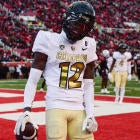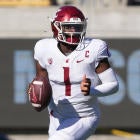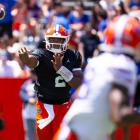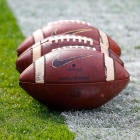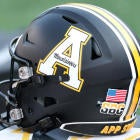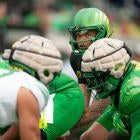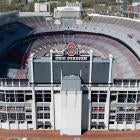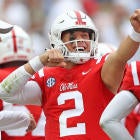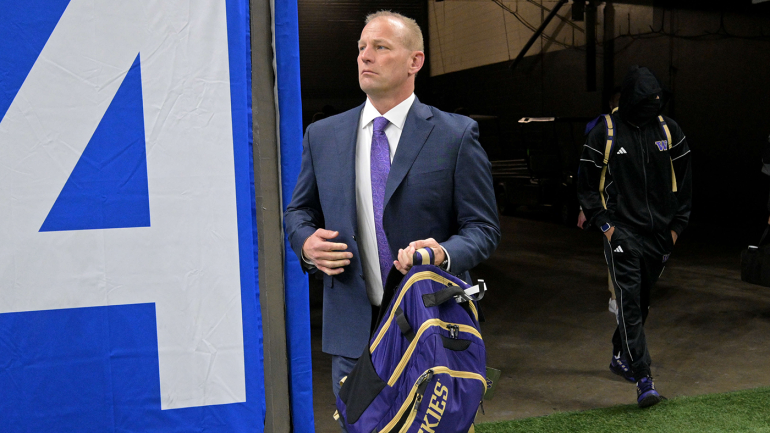
When No. 2 Washington takes the field Monday against No. 1 Michigan, it will not be Kalen DeBoer's first time playing for a national championship. That came when DeBoer's Sioux Falls team battled St. Francis for the 2006 NAIA National Championship in front of 5,000 fans in Savannah, Tennessee.
In fact, DeBoer coached in four straight national title games from 2006-09 at Sioux Falls. He went a ridiculous 67-3 over five years in that role with three undefeated national title seasons across his final four campaign. DeBoer went on to help transform Eastern Michigan, Fresno State and Indiana before finally getting his first head coaching job in the Power Five at Washington.
DeBoer just wins.
In fact, he is the poster child for a growing trend in college football, which is seeing former small-college head coaches win big at the game's highest level.
Kansas' Lance Leipold won six national titles and posted a 109-6 record at Division III Wisconsin-Whitewater. He just wrapped up KU's best season in 13 years. Houston's Willie Fritz has won seven conference titles and four national coach of the year awards at four different levels of the game.
"Sometimes, guys start on third base and think they hit a triple," Fritz told CBS Sports. "I learned something by going around the bases. I think it's a huge advantage."
LSU's Brian Kelly won a pair of Division II national championships at Grand Valley State with a 118-35-2 overall record. He twice took Notre Dame to the College Football Playoff. Eastern Michigan's Chris Creighton led programs to conference titles in NAIA, Division III and the FCS. Over the last eight seasons, Creighton has four winning seasons at EMU. Over the prior 20 years, the Eagles had none.
Despite the unprecedented dominance DeBoer brought to Sioux Falls, it took him 10 years to reach the power-conference level. It took another three to land at Washington. Repeatedly, peers say that great coaches exist at every level. For those who find excellence at lower tiers, DeBoer's success is validation.
"Human nature is that we hire for comfort, who we connect to," Leipold told CBS Sports. "I was very fortunate that [former Buffalo athletic director] Danny White is a guy who went outside the norm. … I think the better question is, administrators or presidents, have they been at the lower level to fully understand what everybody has to do?"
Fritz started his head coaching career in the junior college ranks, taking Blinn College to a pair of national championships in the 1990s before landing at Division II Central Missouri. The lack of resources at lower levels meant Fritz gained experience doing a bit of everything from taping ankles to painting fields. When he was able to hire others to handle operations, it came with a far greater understanding of the details.
"I used to sometimes think it was tougher for a guy to go down in levels than to go up," Fritz said. "They've had a lot of things. Every once in a while, I'd get a guy who had maybe coached at a higher level than I was at, and he's looking around for other guys to do some things. And he saw me picking up trash and I said, 'Hey, we've got to do all that stuff.'"
Leipold brought coordinators Brian Borland and Andy Kotelnicki with him from D-III when was hired at Buffalo. It was an adjustment given Borland and Kotelnicki taught real academic classes during their time at Wisconsin-Whitewater with coaching football being only one of many priorities.
That academic teaching background paid serious dividends when they moved to the FBS. Dealine with injuries to Preseason Big 12 Player of the Year Jalon Daniels across the 2023 season, Kotelnicki developed backup quarterback Jason Bean as KU pieced together a 9-4 season, its best since 2007. DeBoer similarly brought coordinators Ryan Grubb and Chuck Morrell from Sioux Falls to Washington.
"Andy was as good a teacher as there was because there was a plan of how to put together a lesson plan and installation and how it worked," Leipold said. "So many times this game is getting watered down with a bunch of guys [hired as coaches] just because they were good players, but they never learned how to put together a plan on teaching a skill.
"You can tell that. I'm not here to criticize. I don't have a name in mind. But when you hire just a bunch of people that have played it, Magic Johnson wasn't a great NBA coach, right? Sometimes, when you find great teachers and communicators, that's a [critical skill] that I think continues to get lost today."
Finding success at lower levels also means dealing with complications. When now-James Madison coach Bob Chesney was hired at Division III Salve Regina in Newport, Rhode Island, the Seahawks shared their practice field with the local middle school. His team would routinely get pushed off the field when it was booked by teenagers. He often found himself doing laundry, filling orders and completing equipment inventory.
And yet, Chesney managed to pull Salve Regina to a 23-9 record, including a top 25 national ranking in his final season. At his next stop, Assumption played with 12 scholarships while opponents had 35. Holy Cross had a tiny walk-on program because of the cost of attendance.
"The ability to be the CFO -- the Chief Figure-It-Out Officer -- that ultimately is what you have to be," Chesney told CBS Sports. "You start thinking about all those things that you have to have flexibility to find a way. There's no job too small and there's no curveball thrown at you that you're not going to be able to find a way to hit because you're constantly dealing in that world."
Figuring it out has largely been Washington's brand under DeBoer. The Huskies have won 21 straight games, the longest active streak in the FBS. Washington has also won 12 straight games decided by single digits. Every week, DeBoer just gets it done.
"You're always in this learning mindset that you're never going to stop learning, you're never going to stop trying to figure out better ways to do things," Chesney said.
What DeBoer took from his journey
Now-Sioux Falls coach Jim Glogowski took a front-row seat to DeBoer's rise. A former player at South Dakota, Glogowski watched DeBoer play down the road at Sioux Falls and later take the program to new heights. DeBoer remains legendary for his exploits on the baseball diamond in Milbank, South Dakota, but ultimately, he focused on football.
Despite his rise onto a Power Five program, Glogowski still sees in DeBoer the DNA of the young coach who became a star in eastern South Dakota.
"Today, if I texted Kalen, he'd get right back to me," Glogowski told CBS Sports. "There's not 'too busy' for this, 'too busy' for that. He's just a regular dude who's a really good football coach."
Leipold got to know DeBoer during the late-2000s during his run at Wisconsin-Whitewater. As two of the best coaches in NAIA and Division III football, the pair were often seated next to one another at award banquets and conventions. Leipold echoed that DeBoer will respond to any call or text, even during his busiest times.
The schematics of football can be taught and learned, especially when a coach is adaptable. Recruiting becomes easier when coaches have more to sell. Across levels, relationships and leadership take center stage.
"Football is football," DeBoer said. "Working with people has been the most transferable piece of it. You want to empower your staff and your team to have a great atmosphere, to facilitate an atmosphere they want to be a part of."
Glogowski told the story of a handful of Sioux Falls alumni who played for DeBoer during his successful run. They traveled to Seattle to watch the Oregon game and saw the Huskies deliver perhaps the performance of the year, a 36-33 victory headlined by Michael Penix Jr. throwing a game-winning touchdown to beat the Ducks.
Postgame is prime recruiting hours for coaches during the season. After fulfilling his responsibilities, DeBoer spent hours meeting with former players, answering every question and enjoying every conversation. Even 15 years later at a higher level of football, DeBoer never forgets where he came from.
"The game of football is really not that complicated," Glogowski said. "You block, you tackle, you throw it, you catch it, right? But getting people to do it on a consistent basis takes relationship building and trust. In Kalen's case, I think he's mastered that."
A new proving ground
On Monday, DeBoer coaches in his first College Football Playoff National Championship. His Washington team doesn't check almost any of the boxes of recent national title winners.
The Huskies started the year outside the top 10 of the AP Top 25. They rank outside of the top 25 of the 247Sports Team Talent Composite. They're the first Pac-12 team since 2014 to win a CFP game, and they hope to become the first to win a national championship since Pete Carroll's USC in 2004. Every week, DeBoer and his staff just figure it out.
"We're all pulling for him," Glogowski said. "[Sioux Falls] is a small school, 1,500 kids. In small schools nowadays, a lot of the identity is tied to athletics. ... The University of Sioux Falls had a coach who's now playing for a national championship at Washington. I mean, you can't put a price tag on that kind of notoriety and publicity that he's generating for us here at USF."
As DeBoer continues rising, more small-college coaches are following.
Curt Cignetti jumped from Division II Indiana University of Pennsylvania to James Madison in the midst of its FBS transition; now, he sits in the big chair at Indiana. The Dukes replaced him with Chesney, who won at Salve Regina, Assumption and Holy Cross. Former Division III East Texas Baptist and FCS Austin Peay coach Scotty Walden landed at UTEP. Nevada hired ex-Montana coach Jeff Choate after a stop coaching linebackers at Texas.
Chesney emphasized that athletic directors should prioritize what's most important to them, whether it's recruiting and NIL management or someone who can build a team and culture.
Leipold and Fritz were more direct that successful coaches from smaller schools are prepared for success at the highest level.
As Washington kicks off against Michigan on Monday, coaches around the country will be watching, hoping for one of their own to win on the biggest stage. Athletic directors and decision makers at major universities will be paying attention, too.
"I think it would just validate that you can accomplish almost anything if you have a great plan in place, great people around you and an ability to be flexible in your plan," Chesney said. "He's not going to win this national championship on that day, he's won it long before he got to that game."
While there will be more eyes, billions of television dollars and a bigger crowd at NRG Stadium in Houston, the same fundamentals that will decide the CFP National Championship have not changed. It takes the staff back to Jim Carroll Stadium in Tennessee when DeBoer first became a champion.
"It's a big deal for everyone next Monday night, but I would venture to say that his national championship games at Sioux Falls were just as important to him at that moment as Monday's game because that's exactly how I feel about our games at Wisconsin-Whitewater," Leipold said. "When you don't let all that change who you are and you're competitive and stay true to it, I think that's what makes Kalen highly successful."














